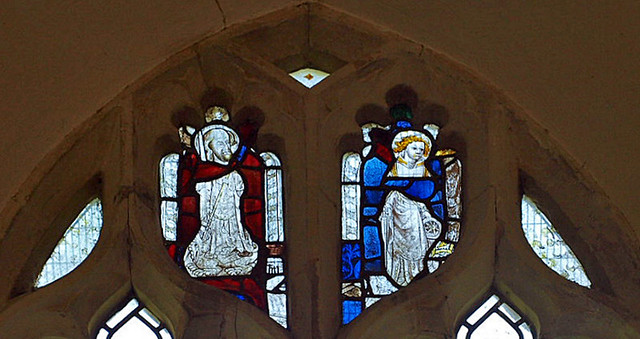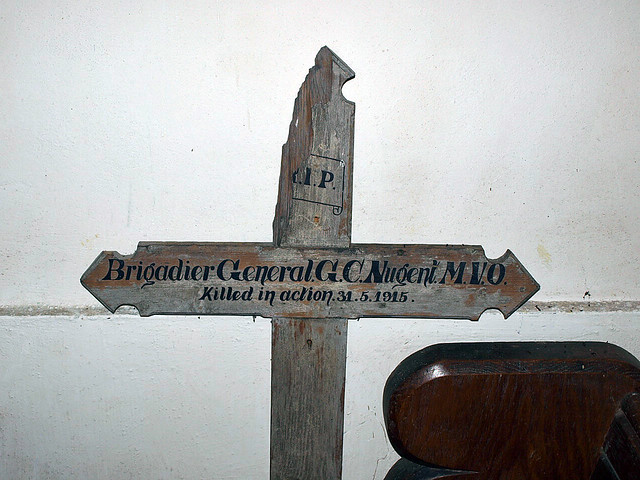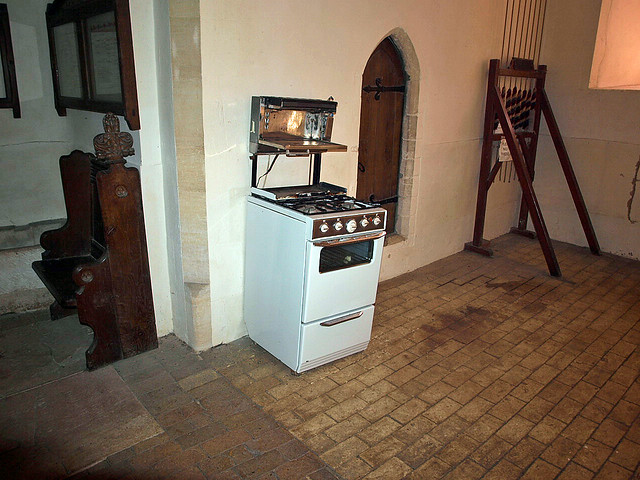Finding the church is not easy. If you rely on your satnav, as I did, you will end up on absurdly minor tracks in the middle of West Harling Heath forest plantation. The church is really only accessible on foot, off the minor road that leads from East Harling to the hamlet of Middle Harling. Just past Middle Harling, heading west, the road takes a sharp left.
A private drive to Berdewell Farm runs straight ahead, through obvious entrance gates. Park along the verge and follow the footpath that runs along the drive [all the way to the end]. The path will veer left through a stand of trees, and you will emerge into the open again to see the church across a farm field. From the entrance gates it will take 10 minutes to reach the church. A good OS map definitely helps!
ALL SAINTS. In a lonely position. West Harling Hall is demolished. Late C13 chancel, see the chancel arch and the S window of two lights with a quatrefoil in plate tracery. The moulding inside is just like that of the chancel arch. Angle piscina in the window. The chancel E window with cusped intersected tracery also tallies. C14 W tower with flushwork in a chequer lozenge pattern on the base, a normal chequer pattern on the battlements. - FONT. Octagonal, with shields and flowers. - PAINTING. A lozenge pattern with fleurs-de-lis in red against the back wall of the sedilia; original, of the time of the chancel? - PLATE. Chalice, Paten, and Flagon, 1677 (Norwich). - MONUMENTS. Brasses to Radulph Fuloflove, priest, d. 1479 (2 ft figure), (to William Berdewell and wife c.1490), and to William Berdewell d. 1508 and wife (18 in. figures); nave. - Richard Gipps by Joseph Wilton, c.1780, with an uncommonly good bust.
WEST HARLING. A road lined with oak trees and meadows runs between East and West Harling, good neighbours in the pleasant valley of the River Thet.
West Harling’s great house has been pulled down, and among the old trees that have gone were some making a ring to mark the site of an ancient church. The existing church stands neat and trim in a clearing of the parkland, greeting East Harling’s church a mile and a half away beyond a vista of trees. Coming chiefly from the 14th century, and crowned by a tall square tower, it has windows five, six, and seven centuries old, and is still lighted by candles. There are fragments of old glass and ancient painting on the walls. Flemish panels in the oak reredos show the Annunciation, Bethlehem scenes with the Shepherds and the Kings, and Christ before Pilate. An old chest mouldering away has four locks and a round lid hollowed out from the trunk of an oak. Modern days have given the nave a hammerbeam roof and the chancel a barrel roof with flower bosses.
Two Berdewells, father and son, are here with their wives in brass. William, who died in 1490, has spurs on his armour, and his wife Elizabeth has a veiled headdress and a lily pomander on the girdle of her gown. He was one of 30 children, and his father, who married twice, lies near the altar. William’s son William has a sword hanging from his belt. His wife is charming in her kennel headdress and long girdle with rosary, pomander, and bag. The oldest memorial is the brass portrait of a priest in rich robes, rector in 1470, rejoicing in the delightful name of Ralf Fuloflove. He lies at prayer in this church he loved, and he left to it a missal and his vestments as a memorial of a devoted ministry. Under a floorstone in the chancel sleep three generations of the Cresseners, who were rectors here for a span of 134 years, from 1596. They were Nicholas, John, and Henry, Henry serving for the last 60 years. For nearly 7000 Sundays the Cresseners were preaching here; and still another long service was that of Richard Deane who was curate and rector here for 57 years through the Napoleon wars.
Two Flanders crosses hang by the inscription to four men who did not come back, one from the grave of George Colborne Nugent, who died in 1915.
West Harling’s great house has been pulled down, and among the old trees that have gone were some making a ring to mark the site of an ancient church. The existing church stands neat and trim in a clearing of the parkland, greeting East Harling’s church a mile and a half away beyond a vista of trees. Coming chiefly from the 14th century, and crowned by a tall square tower, it has windows five, six, and seven centuries old, and is still lighted by candles. There are fragments of old glass and ancient painting on the walls. Flemish panels in the oak reredos show the Annunciation, Bethlehem scenes with the Shepherds and the Kings, and Christ before Pilate. An old chest mouldering away has four locks and a round lid hollowed out from the trunk of an oak. Modern days have given the nave a hammerbeam roof and the chancel a barrel roof with flower bosses.
Two Berdewells, father and son, are here with their wives in brass. William, who died in 1490, has spurs on his armour, and his wife Elizabeth has a veiled headdress and a lily pomander on the girdle of her gown. He was one of 30 children, and his father, who married twice, lies near the altar. William’s son William has a sword hanging from his belt. His wife is charming in her kennel headdress and long girdle with rosary, pomander, and bag. The oldest memorial is the brass portrait of a priest in rich robes, rector in 1470, rejoicing in the delightful name of Ralf Fuloflove. He lies at prayer in this church he loved, and he left to it a missal and his vestments as a memorial of a devoted ministry. Under a floorstone in the chancel sleep three generations of the Cresseners, who were rectors here for a span of 134 years, from 1596. They were Nicholas, John, and Henry, Henry serving for the last 60 years. For nearly 7000 Sundays the Cresseners were preaching here; and still another long service was that of Richard Deane who was curate and rector here for 57 years through the Napoleon wars.
Two Flanders crosses hang by the inscription to four men who did not come back, one from the grave of George Colborne Nugent, who died in 1915.



No comments:
Post a Comment